Alexa を ChatGPT として応答させることで、Alexa を強化します。
このリポジトリには、OpenAI API を使用して ChatGPT モデルから応答を生成する単純な Alexa スキルを作成する方法に関するチュートリアルが含まれています。
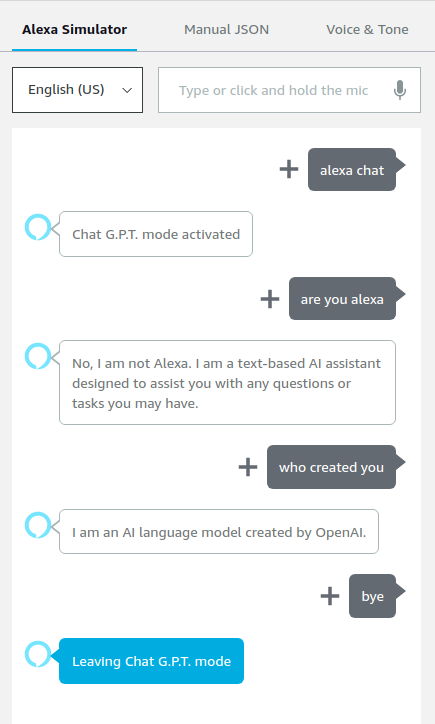
Amazon 開発者アカウントにログインし、Alexa 開発者コンソールに移動します。
「スキルの作成」をクリックし、スキルに「チャット」という名前を付けます。言語に応じてプライマリ ロケールを選択します。
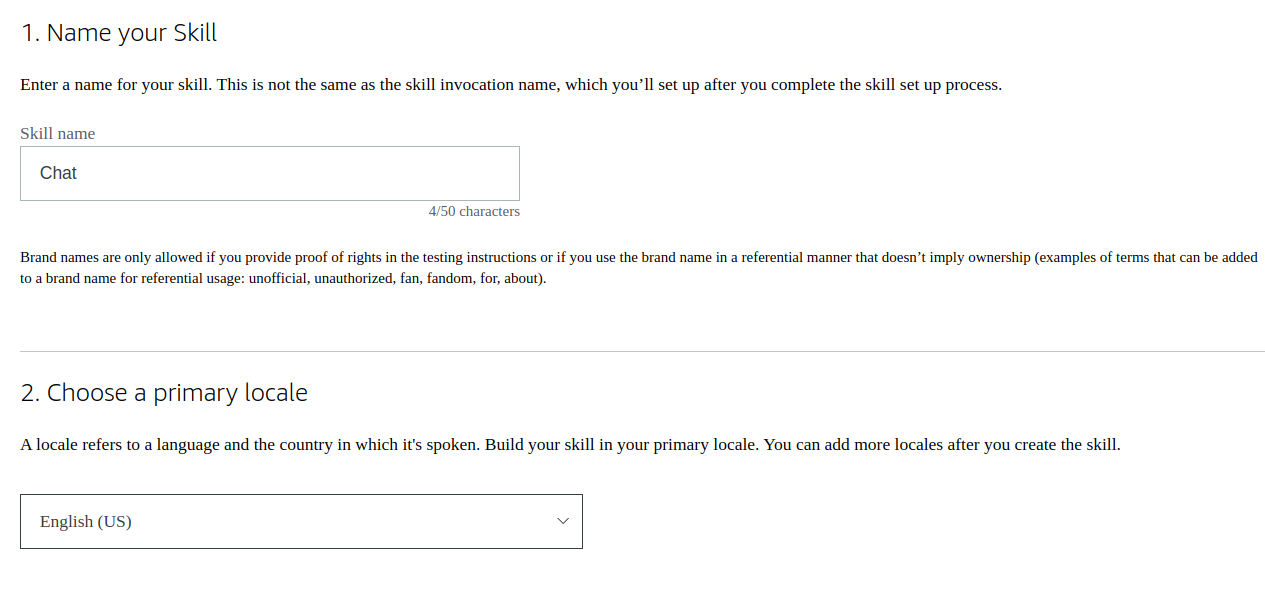
モデルとして「その他」と「カスタム」を選択します。

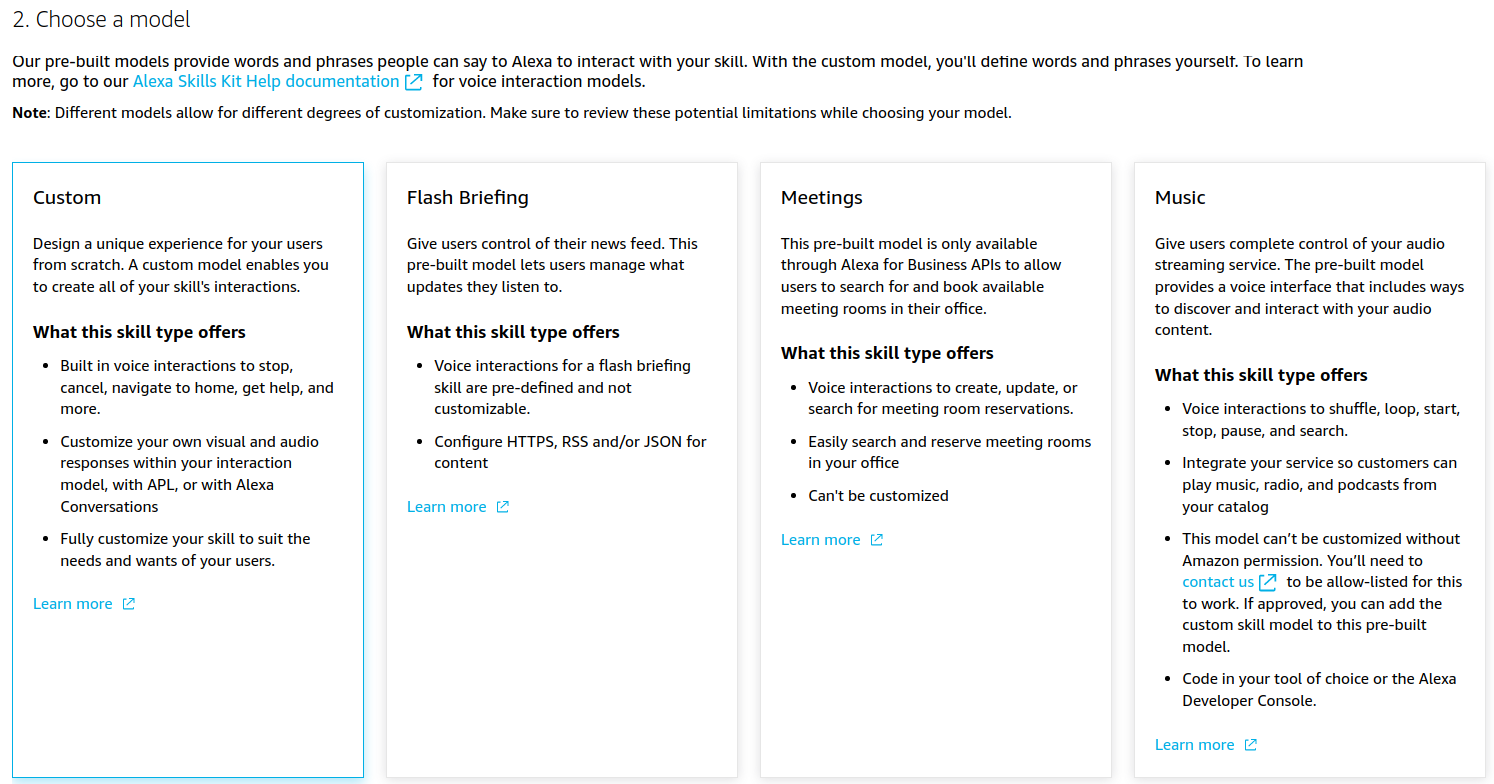
バックエンドリソースとして「Alexa-hosted (Python)」を選択します。
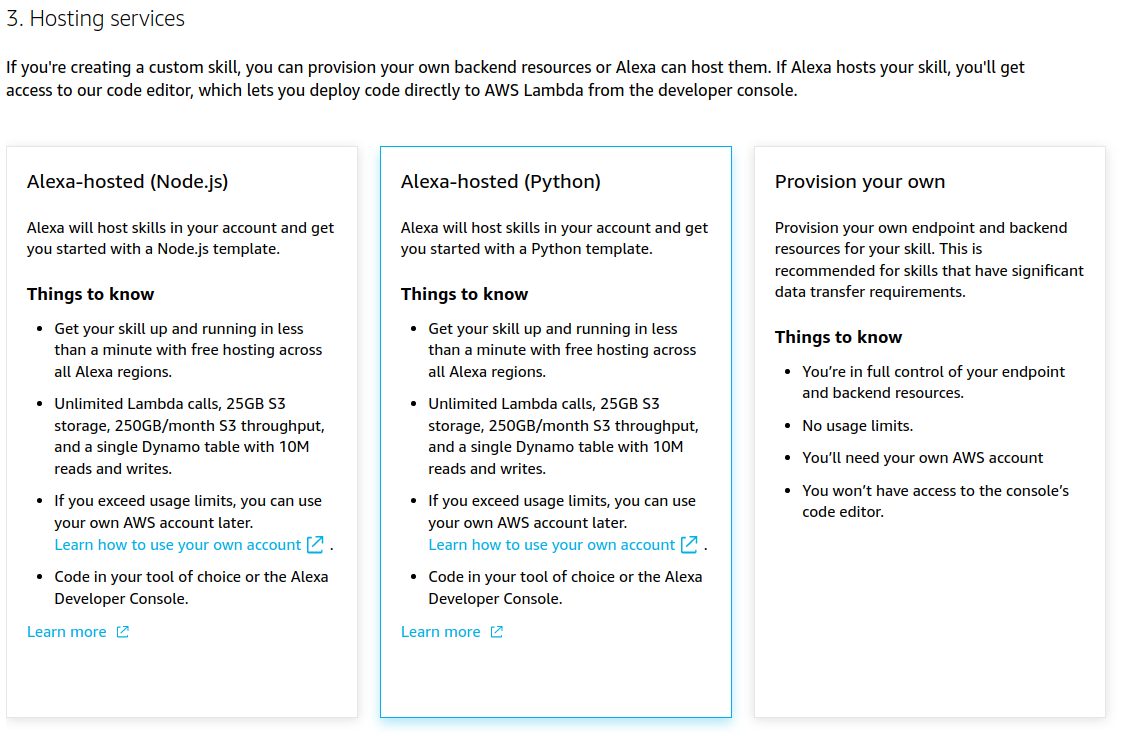
次の 2 つのオプションがあります。
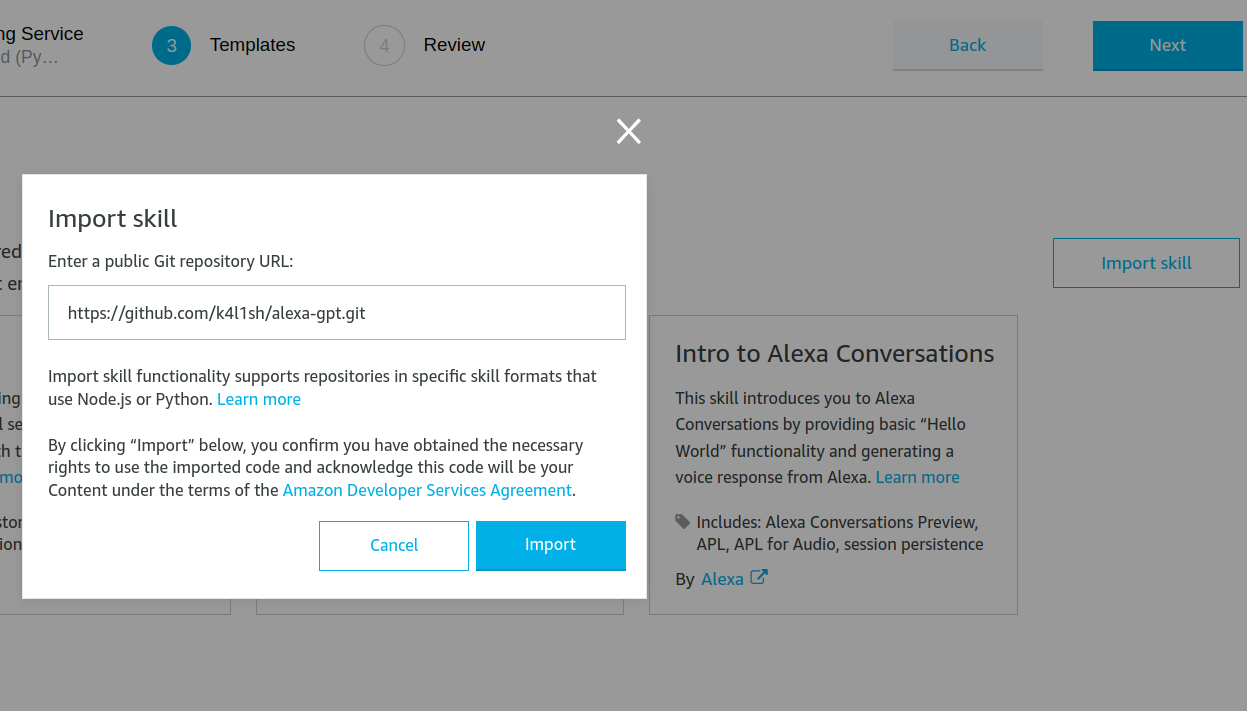
またはスキルを手動で作成したい場合
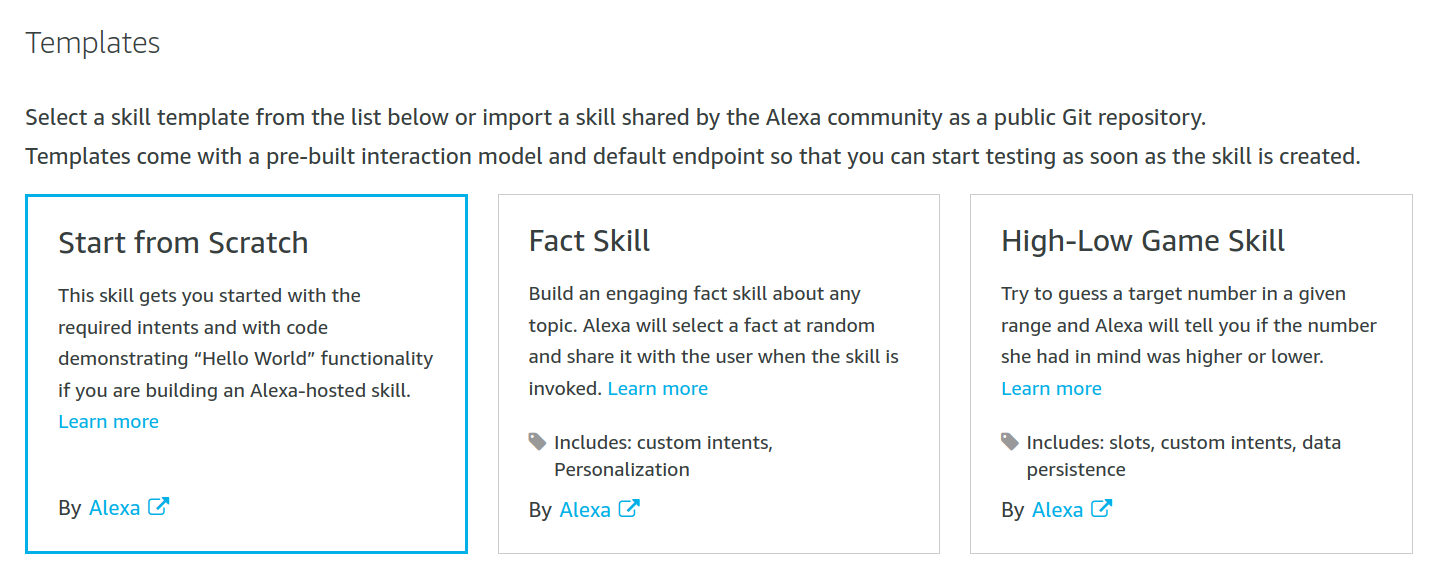
「ビルド」セクションで、「JSON エディター」タブに移動します。
このリポジトリからスキルを直接インポートした場合は、「invocationName」を「chat」またはアクティブ化に使用する別の優先語に変更するだけで、ステップ 12 に進みます。
ただし、スキルを手動で作成することを選択した場合は、既存の JSON コンテンツを提供された JSON コンテンツに置き換えます。
{
"interactionModel" : {
"languageModel" : {
"invocationName" : " chat " ,
"intents" : [
{
"name" : " GptQueryIntent " ,
"slots" : [
{
"name" : " query " ,
"type" : " AMAZON.Person "
}
],
"samples" : [
" {query} "
]
},
{
"name" : " AMAZON.CancelIntent " ,
"samples" : []
},
{
"name" : " AMAZON.HelpIntent " ,
"samples" : []
},
{
"name" : " AMAZON.StopIntent " ,
"samples" : []
},
{
"name" : " AMAZON.NavigateHomeIntent " ,
"samples" : []
}
],
"types" : []
}
}
}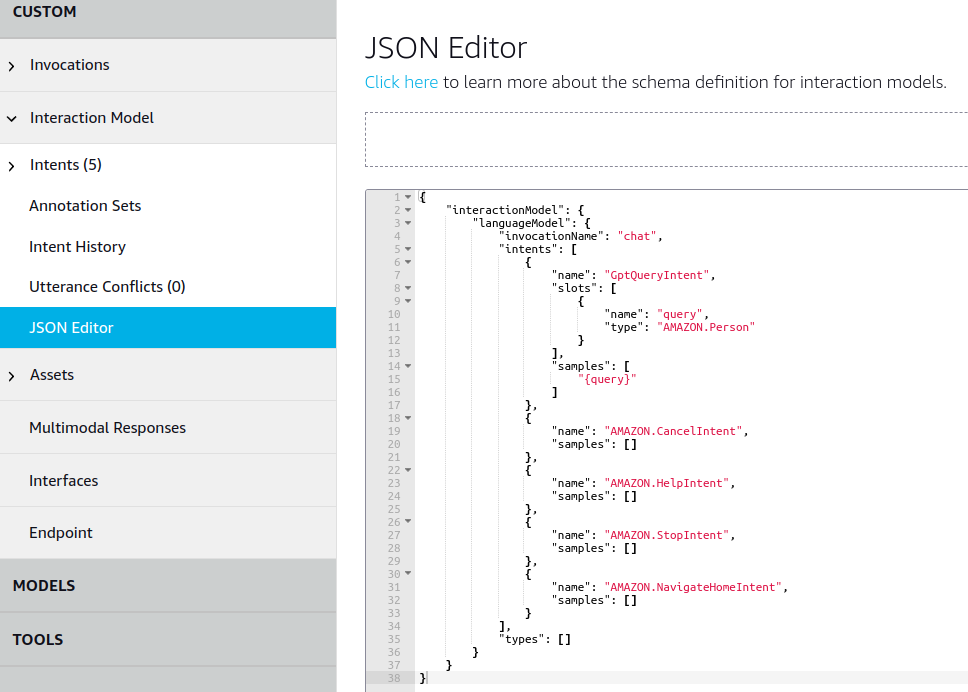
モデルを保存し、「Build Model」をクリックします。
「コード」セクションに移動し、requirements.txt に「openai」を追加します。あなたのrequirements.txtは次のようになるはずです:
ask-sdk-core==1.11.0
boto3==1.9.216
requests>=2.20.0API キー ページで [+ 新しい秘密キーの作成] をクリックして OpenAI API キーを作成します。
lambda_functions.py ファイルを提供された lambda_function.py に置き換えます。
from ask_sdk_core . dispatch_components import AbstractExceptionHandler
from ask_sdk_core . dispatch_components import AbstractRequestHandler
from ask_sdk_core . skill_builder import SkillBuilder
from ask_sdk_core . handler_input import HandlerInput
from ask_sdk_model import Response
import ask_sdk_core . utils as ask_utils
import requests
import logging
import json
# Set your OpenAI API key
api_key = "YOUR_API_KEY"
logger = logging . getLogger ( __name__ )
logger . setLevel ( logging . INFO )
class LaunchRequestHandler ( AbstractRequestHandler ):
"""Handler for Skill Launch."""
def can_handle ( self , handler_input ):
# type: (HandlerInput) -> bool
return ask_utils . is_request_type ( "LaunchRequest" )( handler_input )
def handle ( self , handler_input ):
# type: (HandlerInput) -> Response
speak_output = "Chat G.P.T. mode activated"
session_attr = handler_input . attributes_manager . session_attributes
session_attr [ "chat_history" ] = []
return (
handler_input . response_builder
. speak ( speak_output )
. ask ( speak_output )
. response
)
class GptQueryIntentHandler ( AbstractRequestHandler ):
"""Handler for Gpt Query Intent."""
def can_handle ( self , handler_input ):
# type: (HandlerInput) -> bool
return ask_utils . is_intent_name ( "GptQueryIntent" )( handler_input )
def handle ( self , handler_input ):
# type: (HandlerInput) -> Response
query = handler_input . request_envelope . request . intent . slots [ "query" ]. value
session_attr = handler_input . attributes_manager . session_attributes
if "chat_history" not in session_attr :
session_attr [ "chat_history" ] = []
response = generate_gpt_response ( session_attr [ "chat_history" ], query )
session_attr [ "chat_history" ]. append (( query , response ))
return (
handler_input . response_builder
. speak ( response )
. ask ( "Any other questions?" )
. response
)
class CatchAllExceptionHandler ( AbstractExceptionHandler ):
"""Generic error handling to capture any syntax or routing errors."""
def can_handle ( self , handler_input , exception ):
# type: (HandlerInput, Exception) -> bool
return True
def handle ( self , handler_input , exception ):
# type: (HandlerInput, Exception) -> Response
logger . error ( exception , exc_info = True )
speak_output = "Sorry, I had trouble doing what you asked. Please try again."
return (
handler_input . response_builder
. speak ( speak_output )
. ask ( speak_output )
. response
)
class CancelOrStopIntentHandler ( AbstractRequestHandler ):
"""Single handler for Cancel and Stop Intent."""
def can_handle ( self , handler_input ):
# type: (HandlerInput) -> bool
return ( ask_utils . is_intent_name ( "AMAZON.CancelIntent" )( handler_input ) or
ask_utils . is_intent_name ( "AMAZON.StopIntent" )( handler_input ))
def handle ( self , handler_input ):
# type: (HandlerInput) -> Response
speak_output = "Leaving Chat G.P.T. mode"
return (
handler_input . response_builder
. speak ( speak_output )
. response
)
def generate_gpt_response ( chat_history , new_question ):
"""Generates a GPT response to a new question"""
headers = {
"Authorization" : f"Bearer { api_key } " ,
"Content-Type" : "application/json"
}
url = "https://api.openai.com/v1/chat/completions"
messages = [{ "role" : "system" , "content" : "You are a helpful assistant. Answer in 50 words or less." }]
for question , answer in chat_history [ - 10 :]:
messages . append ({ "role" : "user" , "content" : question })
messages . append ({ "role" : "assistant" , "content" : answer })
messages . append ({ "role" : "user" , "content" : new_question })
data = {
"model" : "gpt-4o-mini" ,
"messages" : messages ,
"max_tokens" : 300 ,
"temperature" : 0.5
}
try :
response = requests . post ( url , headers = headers , data = json . dumps ( data ))
response_data = response . json ()
if response . ok :
return response_data [ 'choices' ][ 0 ][ 'message' ][ 'content' ]
else :
return f"Error { response . status_code } : { response_data [ 'error' ][ 'message' ] } "
except Exception as e :
return f"Error generating response: { str ( e ) } "
sb = SkillBuilder ()
sb . add_request_handler ( LaunchRequestHandler ())
sb . add_request_handler ( GptQueryIntentHandler ())
sb . add_request_handler ( CancelOrStopIntentHandler ())
sb . add_exception_handler ( CatchAllExceptionHandler ())
lambda_handler = sb . lambda_handler ()OpenAI アカウントから取得した OpenAI API キーを入力します。
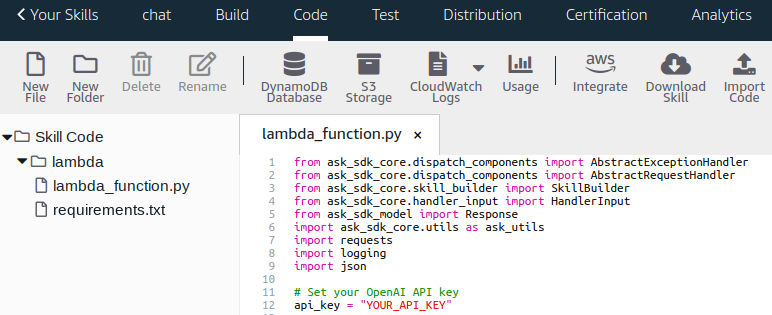
保存して展開します。 「テスト」セクションに移動し、「開発」の「スキルテスト」を有効にします。

これで、ChatGPT モードで Alexa を使用する準備が整いました。次のような結果が表示されるはずです。

このスキルを実行すると、AWS Lambda と OpenAI API の両方を使用するためのコストが発生することに注意してください。予期せぬ料金が発生しないように、料金体系を理解し、使用状況を監視してください。